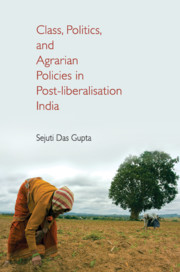Book contents
- Frontmatter
- Dedication
- Contents
- List of Tables and Figures
- List of Abbreviations
- Acknowledgements
- Miscellaneous Frontmatter
- 1 Introduction
- 2 Policy-making, Class Factor, and Political Settlement: Setting the Theoretical Framework
- 3 Privatising the Inputs of Production: A Case of Careful Choice of Beneficiaries and Losers
- 4 Chhattisgarh: New State, New Opportunities for Old Class Domination
- 5 Gujarat: Strong State-directed Capitalism Across Sectors
- 6 Karnataka: State Patronage, Market Opportunism, and Urban–rural Closing Gap
- 7 State in Action, Political Settlement, and the Agrarian Flux
- Bibliography
- Index
1 - Introduction
Published online by Cambridge University Press: 16 March 2019
- Frontmatter
- Dedication
- Contents
- List of Tables and Figures
- List of Abbreviations
- Acknowledgements
- Miscellaneous Frontmatter
- 1 Introduction
- 2 Policy-making, Class Factor, and Political Settlement: Setting the Theoretical Framework
- 3 Privatising the Inputs of Production: A Case of Careful Choice of Beneficiaries and Losers
- 4 Chhattisgarh: New State, New Opportunities for Old Class Domination
- 5 Gujarat: Strong State-directed Capitalism Across Sectors
- 6 Karnataka: State Patronage, Market Opportunism, and Urban–rural Closing Gap
- 7 State in Action, Political Settlement, and the Agrarian Flux
- Bibliography
- Index
Summary
India has been rapidly changing since liberalisation. Several characterisations have been attributed to India's transformation. Some prefer to talk about rapid urbanisation and fast growth with incoming global investments, the IT boom, and expanding middle class while others would rather talk about agrarian crises, farmers’ suicides, food insecurity, and corruption under the United Progressive Alliance (UPA) led by the Congress. Corruption came to light, particularly with numerous mining projects and the 2G scam. Mining has also been linked to land acquisition, both legal and illegal, and movements such as the Narmada Bachao and Singur–Nandigram. Many depict the rural population of India as losers in the new era. However, newspapers report that 40 per cent of India's rich live in these rural areas and hence, the pressing need to capture these markets. The National Democratic Alliance (NDA) led by the Bhartiya Janata Party (BJP) lost in 2004 on the India Shining campaign, but the Modi wave helped the BJP win the election in 2014. A part of the wave was the much-talked-about ‘Gujarat model of development’ with rapid agricultural and industrial growth that successfully diverted attention from Godhra. The 2014 victory bears testimony to how the promise for rapid development can be used as a ploy to overlook political killings and communal riots in ‘new India’. It sounds rather perplexing, a politically fragile yet economically robust country. By employing an interdisciplinary perspective, the book argues that all of these attributes are about ‘one India’ as much as it seems like referring to two distinct entities. It attempts to make sense of these apparent divergent changes by scrutinising the underlying shifting class–state relations in the neoliberal era through the frame of agrarian politics, class formation, and policies.
Based on post-liberalisation India, this book analyses the political economy of agricultural policy and the class–state relations operating in India, scrutinising the tenets of agricultural policies of three states in India – Chhattisgarh, Gujarat, and Karnataka. It analyses the effect of agrarian policy on class and class impact on policy-making and addresses three primary concerns in this regard. First, whether agrarian policies, since liberalisation, have been continuous or there has been a shift in them; if so, what political economy factors have triggered such a change?
- Type
- Chapter
- Information
- Publisher: Cambridge University PressPrint publication year: 2019



